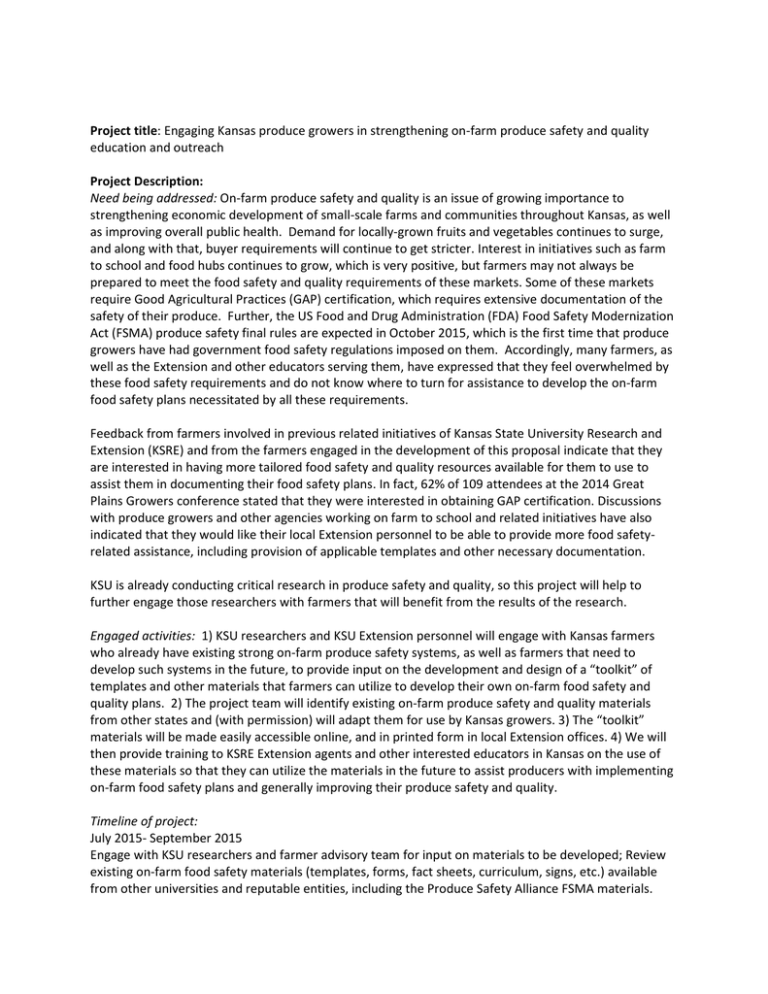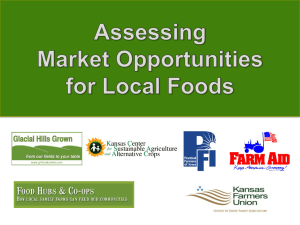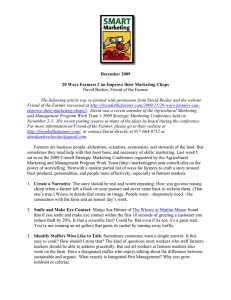Document 13001091
advertisement

Project title: Engaging Kansas produce growers in strengthening on-­‐farm produce safety and quality education and outreach Project Description: Need being addressed: On-­‐farm produce safety and quality is an issue of growing importance to strengthening economic development of small-­‐scale farms and communities throughout Kansas, as well as improving overall public health. Demand for locally-­‐grown fruits and vegetables continues to surge, and along with that, buyer requirements will continue to get stricter. Interest in initiatives such as farm to school and food hubs continues to grow, which is very positive, but farmers may not always be prepared to meet the food safety and quality requirements of these markets. Some of these markets require Good Agricultural Practices (GAP) certification, which requires extensive documentation of the safety of their produce. Further, the US Food and Drug Administration (FDA) Food Safety Modernization Act (FSMA) produce safety final rules are expected in October 2015, which is the first time that produce growers have had government food safety regulations imposed on them. Accordingly, many farmers, as well as the Extension and other educators serving them, have expressed that they feel overwhelmed by these food safety requirements and do not know where to turn for assistance to develop the on-­‐farm food safety plans necessitated by all these requirements. Feedback from farmers involved in previous related initiatives of Kansas State University Research and Extension (KSRE) and from the farmers engaged in the development of this proposal indicate that they are interested in having more tailored food safety and quality resources available for them to use to assist them in documenting their food safety plans. In fact, 62% of 109 attendees at the 2014 Great Plains Growers conference stated that they were interested in obtaining GAP certification. Discussions with produce growers and other agencies working on farm to school and related initiatives have also indicated that they would like their local Extension personnel to be able to provide more food safety-­‐ related assistance, including provision of applicable templates and other necessary documentation. KSU is already conducting critical research in produce safety and quality, so this project will help to further engage those researchers with farmers that will benefit from the results of the research. Engaged activities: 1) KSU researchers and KSU Extension personnel will engage with Kansas farmers who already have existing strong on-­‐farm produce safety systems, as well as farmers that need to develop such systems in the future, to provide input on the development and design of a “toolkit” of templates and other materials that farmers can utilize to develop their own on-­‐farm food safety and quality plans. 2) The project team will identify existing on-­‐farm produce safety and quality materials from other states and (with permission) will adapt them for use by Kansas growers. 3) The “toolkit” materials will be made easily accessible online, and in printed form in local Extension offices. 4) We will then provide training to KSRE Extension agents and other interested educators in Kansas on the use of these materials so that they can utilize the materials in the future to assist producers with implementing on-­‐farm food safety plans and generally improving their produce safety and quality. Timeline of project: July 2015-­‐ September 2015 Engage with KSU researchers and farmer advisory team for input on materials to be developed; Review existing on-­‐farm food safety materials (templates, forms, fact sheets, curriculum, signs, etc.) available from other universities and reputable entities, including the Produce Safety Alliance FSMA materials. October-­‐ December 2015 Adaptation of identified materials to situation of most producers in KS; Development of any tools and resources needed in KS not currently available elsewhere, including information based on KSU research; Comparison of materials to the FSMA Produce Safety final rule (anticipated to be released by October 2015) to ensure that our FSMA-­‐specific materials reflect the content of the final rule. January-­‐ March 2016 Meet again with the farmer advisory team for their input on the developed materials, and subsequent revision to materials as needed. April-­‐ June 2016 Post materials online and make available in printed form in local Extension offices. Develop and submit project progress report to CECD July-­‐ December 2016 Conduct training of Extension personnel and other interested educators in Kansas on the use of adapted/developed materials January-­‐ March 2017 Develop project assessment tools and administer relevant follow-­‐up surveys to farmer advisory team and educators involved in training Seek additional external funding to assist in providing training and technical assistance to farmers. April-­‐ June 2017-­‐ Develop and submit final project report to CECD. Accomplishment benchmarks: 1) At least 4 farmers participate in farmer advisory team. 2) Development and posting online of on-­‐farm produce safety and quality “toolkit” for Kansas farmers. 3) Distribution of printed copies of on-­‐farm produce safety and quality “toolkit” to local KSRE Extension offices 4) At least 10 local Extension personnel participate in training of trainer event 5) At least 3 farmer advisory team members respond to project follow-­‐up survey 6) At least 8 local Extension personnel respond to project follow-­‐up survey Collaborative partners: Londa Nwadike (PI)-­‐ Dr. Nwadike is an Assistant Professor and Extension Food Safety Specialist for both KSU and the University of Missouri. She will provide overall coordination to the project and will ensure full engagement of all project partners. She has numerous contacts with personnel working in produce safety extension throughout the US and is involved in national-­‐level produce safety education efforts. She has wide-­‐ranging experience in organizing training workshops, developing extension resources and in working with various project partners. Cary Rivard (co-­‐PI)-­‐ Dr. Rivard is an Assistant Professor, Fruit and Vegetable Extension Specialist, and Center Director, KSU Olathe Horticulture Research and Extension Center. He has extensive experience working with Kansas fruit and vegetable growers on various research and extension projects, including produce safety. He will ensure that this project is aligned with other statewide Extension horticulture activities and will assist with engaging local Extension horticulture personnel. Sara Gragg (co-­‐PI)-­‐ Dr. Gragg is an Assistant Professor of Food Science in the Department of Animal Sciences and Industry at KSU. She has been and continues to be engaged in numerous research projects related to produce safety and quality and also co-­‐teaches a produce safety course, as well as other food safety-­‐related courses at KSU. She will ensure that the latest KSU produce safety research results are included in the project materials. Eleni Pliakoni (co-­‐PI)-­‐ Dr. Pliakoni is an Assistant Professor of Urban Food Production and Post-­‐Harvest Handling in the Department of Horticulture, Forestry and Recreation Resources at KSU. She has numerous research projects related to produce quality, as well as produce safety, and co-­‐teaches a produce safety course, as well as other courses related to post-­‐harvest physiology, urban agriculture, and sustainable agriculture at KSU. She will ensure that the latest KSU produce quality research results are included in the project materials. Marlin Bates (collaborator)-­‐ Mr. Bates is the KSU Douglas County Horticulture Extension agent and has great experience in providing training and working with farmers on produce safety and quality. He will ensure that the project materials developed are useful for farmers, as well as for local Extension agents. Kathy Flora-­‐ She is a farmer from Pittsburg, KS who will be on the farmer advisory team. She and her husband raise fresh fruits and vegetables for sale at the Pittsburg farmers market and are very committed to education on produce safety and quality. Dan Kuhn-­‐ He is a farmer from Courtland, KS who will be on the farmer advisory team. Dan’s farm is GAP certified and sells to numerous large wholesale markets, so already has detailed on farm food safety plans in place. He will provide great insight on the materials and information needed for farmers to meet the food safety and quality requirements of wholesale buyers. Allen Schmidt-­‐ He is a farmer from Hays, KS who will be on the farmer advisory team. Allen and his family have recently started raising fresh fruits and vegetables on their farm in Western Kansas and will provide a perspective from newer growers and from the western part of the state. Mike Schoenecker-­‐ He is a farmer from Chanute KS who will be on the farmer advisory team. Mike is a longer-­‐term grower and is currently the president of the KS Fruit and Vegetable Growers Association, so will represent the interests of fruit and vegetable growers from across the state. Potential impact for all collaborative parties: Through this project, Kansas farmers will be able to go to one place to find important produce safety and quality resources which can assist them in meeting upcoming regulatory requirements, as well as being able to access new markets such as selling to schools and institutions, which can improve their profitability. This will help producers to better manage risks and reduce their liability of selling unsafe products and can help them to get GAP certified if they chose to seek that certification. This project will benefit local Extension personnel as they will have produce safety and quality resources tailored to Kansas farmers easily available for them to use in working with local farmers. They will also receive training on how to use those materials, so will be better equipped to answer questions and provide support to produce growers. Many local Extension personnel have some training related to horticulture, but may not have adequate training specifically in commercial produce safety and quality. On campus researchers will also benefit from this project as they will have an opportunity to interact directly with farmers on produce safety and quality issues, which will provide them with useful feedback for future research projects and other potential future collaboration.


